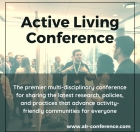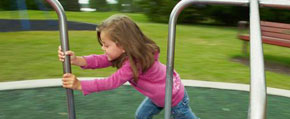9:00 a.m. - 1:30 p.m. Active Living Research Grantee Meeting
ALR Grantees Only
2:00 p.m. - 6:30 p.m. Conference Registration
2:00 p.m. - 2:30 p.m. Conference Welcome and Opening Address
Sarah Lee, Ph.D., Program Committee Chair, Centers for Disease Control and Prevention, Division of Adolescent & School Health (DASH)
James F. Sallis, Ph.D., Director, Active Living Research
Youth Presentation
Gerard Garcia, 11th Grade, Castle Park High School, Chula Vista, CA
2:30 p.m. - 2:45 p.m. Break
2:45 p.m. - 4:15 p.m. Conference (Concurrent) Workshops - Sessions 1
1) Emerging Tools to Estimate Health Impacts of Planning Decisions
I-PLACE3S Overview [pdf], Gordon Garry, Sacramento Council of Governments
Evidence-Based Decision-Making with I-PLACE3S [pdf], Lawrence Frank, Ph.D., University of British Columbia
HealthScape [pdf], Karen Wolf, AICP, King County, Seattle, Washington
This workshop provided an overview of software tools used to quantify the health impacts of planning decisions, with a focus on the web-based tool known as the PLACE3S model. PLACE3S was developed by the Sacramento Council of Governments to evaluate travel behavior impacts of alternative land use and transportation investment decisions and has been used extensively. The workshop described work that is underway to expand this model to include health and climate change-related outcomes using data from 4 different studies based in 3 regions of the U.S. Presented were two separate efforts to incorporate health outcomes from this body of research into the PLACE3S model in the U.S. and Canada and next steps for further model development were discussed. The value of these data to policy makers and examples of communication strategies was discussed.
2) Using Health Impact Assessment to Translate Active Living Research for More Informed Public Policy Decision-Making [pdf]
Brian L. Cole, Dr.P.H., Health Impact Assessment Group, University of California, Los Angeles
Riti Shimkhada, Ph.D., Health Impact Assessment Group, University of California, Los Angeles & San Francisco
This workshop began with a brief overview of health impact assessment (HIA) -- its history, rationale, and scope of current practice. The primary focus of this session was on reviewing the methods of HIA by highlighting specific examples. A secondary focus was to present HIA tools to assess the potential health impacts of proposed policies and projects, and communicate these analyses to decision-makers. The workshop concluded with a discussion of current gaps and limitations in the body of HIA work related to physical activity assessment and promotion and priority action steps for addressing these gaps.
3) Active Living Research 101
Physical Activity and Active Living Research [pdf], James F. Sallis, Ph.D., Director, Active Living Research
Urban Planning and Active Living Research [pdf], Robert B. Cervero, Ph.D., University of California, Berkeley
Leisure Studies, Parks, and Recreation and Active Living Research [pdf], Myron F. Floyd, Ph.D., North Carolina State University
Direct Observation of Physical Activity and Its Contexts [pdf], Thomas McKenzie, Ph.D., San Diego State University
Active Living Research 101 was for those who are new to the active living field. Topics included an overview of the ALR program, guiding concepts and models, basics of transdisciplinary research, examples of validated direct observation tools such as SOPARC (System for Observing Play and Recreation in Communities) and SOPLAY (System for Observing Play and Recreation in Play and Leisure Activity in Youth), examples of funded studies, key results, and future research directions. Presenters represented multiple disciplines.
4) Using Accelerometers and GPS in Active Living Research: Practical Issues [pdf]
Handouts:
Accelerometer and GPS Resources [pdf]
Accelerometer Meter Instructions and Wear Time, TEAN Study [pdf]
Accelerometer Meter Log, NQLS Study [pdf]
Accelerometer Meter and GPS Log, TEAN Study [pdf]
GPS Instructions, TEAN Study [pdf]
Accelerometer Tracking Database (in Microsoft Access) is also available. To request, email Kelli Cain.
Kelli L. Cain, M.A., San Diego State University
Carrie M. Franklin, San Diego State University
Erin Merz, San Diego State University
Jill Dumbauld, San Diego State University
In this workshop participants gained knowledge and shared experiences in using accelerometers for active living research, with an emphasis on data collection and management. The workshop began with an overview of available accelerometers, and practical issues such as equipment care, delivery and retrieval, compliance, tracking systems and data screening was discussed. Protocols that were developed for studies of children and adults were presented with a focus on successful strategies to increase compliance in children. This presentation included demonstrations of databases and software developed to track and screen accelerometer data. Protocols developed for the use of Global Positioning Systems (GPS) in a study of teenagers were also shared.
4:15 p.m. - 4:30 p.m. Break
4:30 p.m. - 6:00 p.m. Conference (Concurrent) Workshops - Sessions 2
1) Youth and Promotoras Advocate for Park Improvements to Enhance Access for Physical Activity [pdf]
Elva Arredondo, Ph.D., San Diego State University
Gerard Garcia, CX3 Youth Group
Kristin Mueller, M.P.H., WalkSanDiego
Maria Elena Aguilar, Chula Vista Community Collaborative
Richard Preuss, Chula Vista Police Department
Tanya Rovira-Osterwalder, M.S., Healthy Eating-Active Communities (HEAC)
The purpose of this workshop was to describe the process and impact of a youth and promotora driven assessment of and advocacy for park improvements to enhance access for physical activity. The information presented included how to engage youth and promotoras to advocate for built environmental changes, along with barriers and facilitators to changes that the youth and promotoras encountered. The workshop provided a model of how collaboration can maximize efforts, bring political support, and leverage resources to improve the built environment for physical activity.
2) Statistical Approaches to Testing Ecological Models of Physical Activity Behavior [pdf]
Ester Cerin, Ph.D., Baylor College of Medicine
Greg Norman, Ph.D., University of California, San Diego
Studies on the environment-physical activity relationships typically generate multilevel, correlated (clustered) data structures. Ignoring the multilevel organization of the data may result in invalid statistical inferences such as finding statistically significant relationships where none exist or not finding relationships when these exist. This workshop discussed several types of analytical approaches to multilevel data including the use of: (1) dummy cluster variables with 'standard' statistical models; (2) robust estimators of standard errors; (3) generalized estimating equations; (4) and multilevel models. The focus was on interpretative issues and applications of these methods in terms of their ability to provide answers to questions arising from studies adopting multilevel ecological models of physical activity behavior. Examples of data analyses using various statistical packages and adopting four different analytical approaches were provided and compared.
3) Communicating to Elected Officials [pdf]
Elizabeth Wenk, Senior Associate for Public Policy, Burness Communications
Stephan Vance, Senior Regional Planner, San Diego Association of Governments
Caridad Sanchez, District Director for San Diego and Imperial Counties, Senator Barbara Boxer's Office
Cheryl Cox, Mayor, Chula Vista, CA
How do you translate your research into policy and communicate it effectively to policymakers at all levels of government? How do you make your work relevant to the policy debates taking place at City Hall and in the halls of Congress? This session gave the tools and techniques you need to translate your work into language that is accessible - and therefore actionable - by government policymakers - and offered tips on how to work with policymakers to make change happen. In this session, participants got the chance to summarize their research and get feedback from elected officials and staff.
4) Best Practices in the Data Reduction and Analysis of Accelerometer and GPS Data
Accelerometer Data [pdf], Stewart Trost, Ph.D., Oregon State University
GPS Data [pdf], Jacqueline Kerr, Ph.D., University of California, San Diego
Fred Raab, University of California, San Diego
In this workshop, presenters led an advanced discussion on using accelerometers and GPS data. The accelerometer portion of the workshop addressed critical issues related to the reduction and interpretation of accelerometer data. Key topics included: wear time requirements - defining a valid monitoring day, identifying spurious data, calibration of accelerometer output - choosing cut-points; computing summary variables, extracting bouts, and imputing data. The GPS section addressed the presentation and analysis of GPS data and included cleaning GPS data, visualizing data, matching GPS data with other outcomes (including accelerometers) and creating meaningful activity variables in time and space.
6:00 p.m. - 6:30 p.m Networking Break
6:30 p.m. - 8:00 p.m. Welcome Reception and ALR Dissertation and New Grantee Poster Session
8:00 p.m. Dinner on your own







